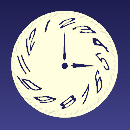

Circadian Sleep Disorders Network is an independent nonprofit organization dedicated to improving the lives of people with chronic circadian rhythm disorders.
We aim to increase awareness within the medical community and among the general public, to provide emotional support and practical ideas for people living with these disorders, to inform patients and health care providers about treatment options, to encourage research into circadian rhythms, and to advocate for accommodations in education and employment for people with circadian rhythm sleep disorders.
Note that Circadian Sleep Disorders Network is not affiliated with any pharmaceutical, medical device, or other company.
Circadian Rhythm Sleep Disorders (CRSDs or CRDs) are neurological disorders in which the sleep-wake cycle is out of sync with the day-night cycle. These include in particular Delayed Sleep Phase Disorder and Non-24-Hour Sleep-Wake Disorder. Also included are Advanced Sleep Phase Disorder, Irregular Sleep Wake Disorder, and Shift Work Disorder, which are defined here.
Delayed Sleep Phase Disorder (DSPD), also called Delayed Sleep Phase Syndrome (DSPS), is characterized by an inability to fall asleep until very late at night, with the resulting need to sleep late in the morning or into the afternoon. Questions? See our DSPD Q&A.
Advanced Sleep Phase Disorder (ASPD), also called Advanced Sleep Phase Syndrome (ASPS), is the opposite. It is characterized by falling asleep very early in the evening, and waking up in the wee hours of early morning, unable to sleep further.
Non-24-Hour Sleep-Wake Disorder (Non-24), also called Free-Running Disorder (FRD), is a condition in which a person's day length is significantly longer than 24 hours, so that sleep times get later each day, cycling around the clock in a matter of days or weeks. Questions? See our Non-24 Q&A.
Some people use the term reverse sleep, referring to the fact that sometimes people with DSPD and Non-24 end up sleeping during daylight and being awake at night.
Please refer to our descriptions,
definitions, and
treatments pages for more details,
and print out our brochure,
fact sheet,
and/or Q&A documents to give to others.
We can progress toward our mission of promoting awareness and accommodation only if we can demonstrate that we represent a community of people who suffer from these disorders. Please join now, so we can better help you and the CSD community in achieving our common goals. Together we have a voice! More details are on the Join page.
Last year's members: if you haven't renewed yet, please do so now. Renew now!
We are a 501(c)(3) organization based in the U.S., serving the global circadian sleep disorders community. We are a patient organization, entirely supported by member dues and contributions. We are all unpaid volunteers.
Circadian Sleep Disorders Network has launched its PATIENT POWERED REGISTRY AND SURVEY for people with Circadian Rhythm Sleep Disorders. The registry is open to anyone with a circadian rhythm sleep disorder from any country. You can sign up for the registry and
take the survey (called a "Patient Insights Network ®") at
CircadianSleepDisorders.org/survey. It's free.
Although we've published some results already, we hope to do a lot more analysis and to include any new participants to improve our statistics.
By collecting information from a large number of people actually suffering from these disorders, we can stimulate research into causes, treatments, and effects of circadian disorders.
We often complain that so little research has been done on people suffering with Circadian Rhythm Sleep Disorders. One reason is the difficulty researchers have in locating people with these disorders. Well, this is your chance! You can make a difference!
The information you provide can jump-start research on some of the questions we've been asking about for years - but only if enough people participate. You can also optionally allow researchers to contact you to participate in studies. Sign up now (free), and please take the survey.
Note that the signup questions that you get first are not the survey! Part of the signup process with Invitae (the registry host) involves answering two pages of demographic questions like age, gender, race, etc. That is not our survey.
After you've finished signing up you will be taken to our survey, called "Circadian Rhythm Sleep Disorders", which asks about your circadian disorders, sleep habits, treatment, and other disorders. Our survey has multiple pages. The actual number is dependent on how you answer some key questions. Please be sure to complete the entire survey. Otherwise, your responses will not be used in analysis.
For more information, and to review the survey instructions and definitions, click here.
Researchers: You can view the survey questions without taking the survey here. You can request participants to contact you for further research by contacting Invitae PIN (Patient Insights Network) (website) or emailing Circadian Sleep Disorders Network at for further information.
 We are asking our members and followers to give our brochure, and/or our Q&A booklets, to their sleep doctors
and their general doctors on their next visits.
It is vital to all of us suffering from circadian disorders that more doctors and their support staff understand these disorders and how disruptive they can be.
The more doctors who know about us, the more patients we can reach, inform, and support. And the larger our membership, the more credible our voice on behalf of all people with circadian sleep disorders.
We are asking our members and followers to give our brochure, and/or our Q&A booklets, to their sleep doctors
and their general doctors on their next visits.
It is vital to all of us suffering from circadian disorders that more doctors and their support staff understand these disorders and how disruptive they can be.
The more doctors who know about us, the more patients we can reach, inform, and support. And the larger our membership, the more credible our voice on behalf of all people with circadian sleep disorders.
You can print out the brochure on U.S. letter paper (8½x11) or on A4 paper (non--U.S.). Booklets can be printed for DSPS or for Non-24 (the same file can be printed on either U.S. or A4 paper). Alternatively you can email us at to request a printed copy of any or all these documents (please specify which, and how many you really need). Be sure to include your name and full postal address. We will send these at no charge to you.
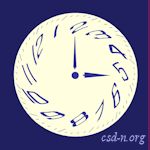
November 2025
Nominations for the CSD-N Board of Directors have closed. One new candidate, Stephen Mathewson, has volunteered to run. Two current Board members, Sarah Hazelwood and Peter Mansbach, are running for re-election.
Since there are three candidates for three slots on the Board, it is not necessary to conduct formal balloting by the membership.
New Board members begin to serve at the start of the next meeting, on Jan 15, 2026.
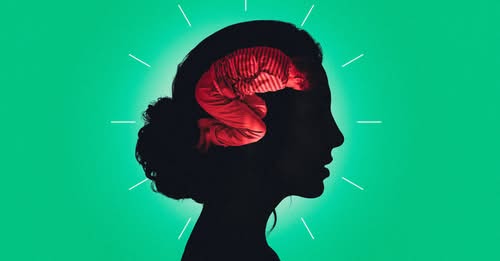
October 2025
Naomi Mittet, former CSD-N secretary and board member, was interviewed for an article in SeattleMet, What It's Like to Truly Be Sleepless in Seattle - Life with a circadian rhythm sleep disorder, by Haley Shapley.
Naomi describes her child's struggles with school, and her own gradual realization that Non-24 was behind those struggles. Another interviewee, Tyler Zuck, describes his experience with DSPD.
October 2025
Circadian Sleep Disorders Network will be holding elections for its Board of Directors. Requirements are described here.
Meetings are held by online forum, so you can log in at any time of day (typically once a day) to read what's been posted and post your replies. Meetings do continue for two months or more, though often not very actively.
If you're interested, please let us know soon (latest Nov 15), following the instructions at the end of the above document. Directors start serving January 15, 2026. Terms generally run for two years.
Currently running for re-election to the board are Peter Mansbach, Sarah Hazelwood, and (provisionally) Samuel Bearg.
We are also often looking for other volunteers willing to help. These can be board members but do not have to be. If you're interested in volunteering, please let us know, including any skills you have. In particular, we need a secretary, who may be, but does not need to be, a board member.
Oct 13, 2025
 CSD-N president Peter Mansbach was interviewed by Abigail Myers, a Ph.D. student at the University of Vermont. Ms Myers is a participant in the National Science Foundation's I-Corps (Innovation Corps) program.
CSD-N president Peter Mansbach was interviewed by Abigail Myers, a Ph.D. student at the University of Vermont. Ms Myers is a participant in the National Science Foundation's I-Corps (Innovation Corps) program.
She was interested in the problems circadian rhythm sleep disorders patients face, our needs for research, and how that research might translate into practice. She was particularly interested in melatonin. Peter reviewed some of his own experiences, and referred her to our Needed Research document and our survey results publication.
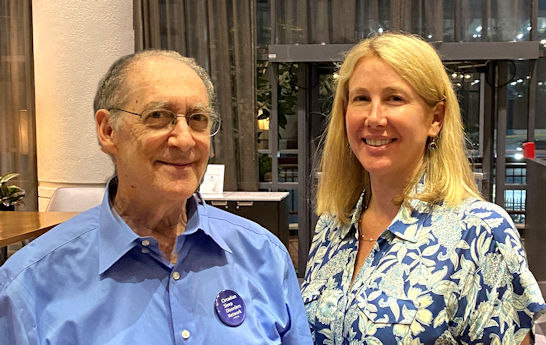
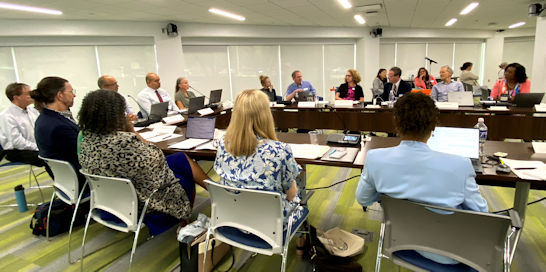
August 2025
On August 7 and 8, 2025, the NIH (U.S. National Institutes of Health) Sleep Disorders Research Advisory Board (SDRAB) in-person meeting was held in Bethesda. CSD-N Executive Vice President Alex Wharton, our SDRAB representative, attended. CSD-N President Peter Mansbach also attended on the first day.
SDRAB members (sleep physicians, researchers and patient advocates) and attendees shared their perspectives on a range of sleep health matters. Speakers included Dr. Anita Shelgikar, president of the American Academy of Sleep Medicine, Dr. Klar Yaggi, director of Yale Center for Sleep Medicine and Dr. John Hogenesch, president of the Society for Research on Biological Rhythms.
The purpose of the meeting was to make recommendations for refreshing the goals of the NIH Sleep Research Plan, which was last published in 2021. One of the sections of the Research Plan focuses on elucidating sleep and circadian mechanisms that underlie health and disease.
On August 7, Alex spoke about the need for a faster time-to-diagnosis for DSPD. She recommended a detailed patient history that includes family members, testing for biomarkers like melatonin and cortisol and DNA testing for variants of clock genes.
She stressed that there is no silver bullet for treating DSPD. Treatments that are proven to be effective for shifting sleep earlier for some late chronotypes / night owls such as light therapy, phase-delay chronotherapy, SSRIs, CBT or stricter schedules are not effective for DSPD. She hopes that as awareness builds, accommodations for later start times at work and school (and starting all schools later) will become more accepted.
One of the talks called for increased awareness of the impact of sleep health on one's risk of diabetes. Peter noted that his doctor knew about that connection - she told him that "going to bed at 3:30 a.m. is going to increase your risk of diabetes" - but did not understand that individual circadian phase needs to be taken into account. We still need to raise awareness of circadian rhythm disorders and their impacts.
On August 8, Alex spoke about the danger of anticholinergic medications (diphenhydramine, some antidepressants such as Trazodone and hypnotics such as Ambien) that many DSPD patients use regularly. There was a recent study linking the long-term use of anticholinergic medications to an increased risk of dementia. The comments were relevant to two SDRAB members' work - Dr. Alberto Ramos and Dr. Paula Desplats - who are studying dementia and neurodegeneration in older adults.
Alex thanked the NCSDR staff for including Dr. Michael Sesma's presentation at the December meeting. He highlighted labs across the country that are researching aspects of the molecular clock.
August 2025
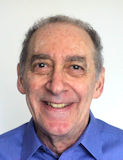 CSD-N had an inquiry from ARPA-H (Advanced Research Projects Agency for Health, part of the U.S. Dept of Health and Human Services). CSD-N president Peter Mansbach spoke with their representative. They recognize that circadian rhythms affect many biological processes, and disorders of the circadian rhythm may affect health in many ways, and they are interested in those connections. We discussed, among other things, the need for simpler tests for circadian phase; and our survey observation that depression often followed circadian misalignment rather than causing it.
CSD-N had an inquiry from ARPA-H (Advanced Research Projects Agency for Health, part of the U.S. Dept of Health and Human Services). CSD-N president Peter Mansbach spoke with their representative. They recognize that circadian rhythms affect many biological processes, and disorders of the circadian rhythm may affect health in many ways, and they are interested in those connections. We discussed, among other things, the need for simpler tests for circadian phase; and our survey observation that depression often followed circadian misalignment rather than causing it.
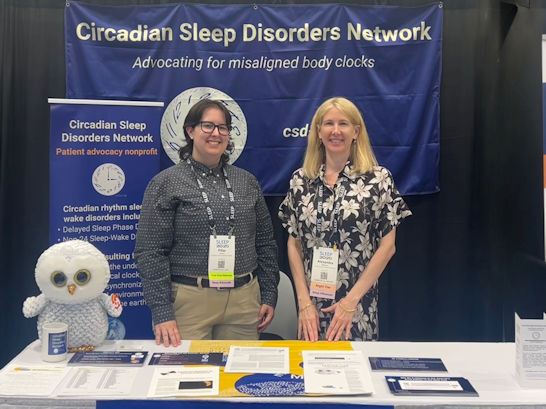
June 2025
From June 8 to June 11, 2025, the APSS annual SLEEP conference was held in Seattle, Washington. CSD-N Executive Vice President Alex Wharton and Board Member Pillar Quinn attended the event and hosted CSD-N's booth, located in the Advocacy Pavilion of the exhibit hall.
Alex and Pillar answered questions and shared information about DSWPD and Non-24 patient experiences with the booth's steady stream of visitors (physicians, scientists, students and patients). The visitors offered ideas for improving CRD diagnosis such as biomarker testing, including melatonin and cortisol, and screening scales that inquire about chronotype, including the Pittsburgh Sleep Quality Index and Munich Chronotype Questionnaire. Alex highlighted circadian clock research studies in labs across the country and collaborated with fellow sleep disorder patient advocates about sharing resources and efforts.
Alex and Pillar also participated in a range of events and gatherings. Alex was CSD-N's representative at the AASM Patient Advocacy Roundtable in-person meeting, led by 2024 AASM President Dr. Eric Olson, and attended by several patient advocacy organizations including Project Sleep, Narcolepsy Network and Alliance of Sleep Apnea Partners.
Educational sessions they attended included: Circadian Rhythms and Their Impact on Health: From Genetic Variations to Metabolic Responses, co-chaired by Dr. Christopher Depner and Dr. Dayna Johnson, and Circadian Medicine: Centering Interventions Around Sleep or the Clock?, chaired by Dr. Saurabh Suhas Thosar.

Dec 2024
The NIH Sleep Disorders Research Advisory Board (SDRAB) meeting was held on December 4, 2024 with CSD-N Vice President Alex Wharton (photo at left), our SDRAB representative, in attendance. The one-day meeting was replete with updates and discussions about circadian rhythm research.
SDRAB Chair and Director of the University of Chicago Sleep Center, Dr. Esra Tasali, explained that sleep medicine and circadian medicine are intersecting - and that trainees should be educated on both of these interrelated biologies. She also stressed the importance of scientists reporting on circadian markers when conducting sleep research.
Dr. John Hogenesch, geneticist, professor of pediatrics at the Cincinnati Children's Hospital and president of The Society for Research on Biological Rhythms, described SRBR's interests and activities. The international society advocates for policies that take biological rhythms into account to improve human health including permanent standard time, later school start times and chronotherapy (timing of medications). He explained that up to 25% of all medications could be improved by timing and that medication should be administered based on a person's internal circadian rhythms to maximize effectiveness.
Alex asked Dr. Hogenesch how CRD sufferers could access genetic testing specifically for the human circadian clock gene CRY1, which is associated with a familial form of DSPD in 1 in 75 individuals with non-Finnish European ancestry. A mutation in CRY1 alters the human circadian clock, and carriers of the gene variant experience an intractable delay of sleep onset compared to non-carriers. Genetic testing could improve diagnosis for people living with CRDs as we struggle to "prove" the conditions are physiological and not psychological.
For the Sleep Research Coordinating Committee presentation, Dr. Michael Sesma, an NIH health science administrator, presented a portfolio of work of several labs across the country that are studying various aspects of circadian rhythms. Here are some of highlights from Dr. Sesma's talk.

Mar 2025
Project Sleep's Rising Voices leadership program trains people with sleep disorders to become effective advocates through authentic storytelling and public speaking. Graduates are equipped to share their stories with healthcare providers, universities, local communities, news outlets, blogs, and more, to help raise awareness and reduce stigma.
The 2025 Rising Voices training will take place *online* from June 15-July 20. Spots are limited—the application deadline is April 15th, 2025, at 12 midnight ET.
For details and application click here.

Jan 2025
The American Academy of Sleep Medicine has released a new position statement emphasizing the clinical significance of sleepiness and its impact on performance, health, mood, safety, and quality of life.
The position states that sleepiness is a critical patient-reported outcome that is associated with an increased risk for adverse health effects and diminished quality of life. The statement urges health care professionals, policymakers, and researchers to prioritize the evaluation, management, and treatment of sleepiness to improve public health.
Circadian Sleep Disorders Network is listed as an organization supporting their position statement.
Full article is here.
Full peer-reviewed paper is:
Heffron TM, Gurubhagavatula I, Trotti LM, et al, Clinical significance of sleepiness: an American Academy of Sleep Medicine position statement, Journal of Clinical Sleep Medicine, AASM, 2025
 Pillar Quinn |
 Antonis Papathanasiou |
Dec 2024
We had five incumbents and two new people running for seven open slots on the Board, so a formal election by the membership was not required. We welcome new board members Pillar Quinn and Antonis Papathanasiou. Pillar lives in Everett, WA (U.S.), and Antonis lives in Greece. Photos above.
Five incumbent board members were up for re-election, and will serve another two years. They are Andrew Cowen, James Fadden, Leslie Head, Lynn McGovern, and Alexandra Wharton. Three more have terms expiring next year: Samuel Bearg, Sarah Hazelwood, and Peter Mansbach. Photos and locations are at circadiansleepdisorders.org/aboutus.php#BofD
Maggie Leppert chose not to run again, and resigned from being secretary. We wish her well.

Oct 2024
On October 28 and 29, 2024, Circadian Sleep Disorders Network Vice President Alexandra Wharton attended the fifth annual Sleep Advocacy Forum and Hill Day in Washington, DC.
This year's Forum - facilitated by Project Sleep - brought together patients, policymakers and sleep community leaders to address critical issues in sleep health. Speakers included Dr. Marishka Brown, director of the NIH National Center on Sleep Disorders Research, who discussed emerging opportunities in circadian research. Josh Andrews, a retired NFL offensive lineman, spoke about his experience playing professional football while living with narcolepsy.
On Hill Day, attendees from 42 patient advocacy organizations and professional societies divided into seven teams. These teams conducted more than 50 meetings with legislative staff about the need to elevate awareness of sleep disorders - especially among school nurses, teachers and students. Alexandra was part of a team (photo above) that visited several Texas congressional offices including U.S. Representative Lloyd Doggett. She is second from the left.
Oct 2024
Circadian Sleep Disorders Network will be holding elections for its Board of Directors. Requirements are described here.
Meetings are held by online forum, so you can log in at any time of day (typically once a day) to read what's been posted and post your replies. Meetings do continue for two months or more, though often not very actively.
If you're interested, please let us know soon (latest Nov 10), following the instructions at the end of the above document. Directors start serving January 15, 2025. Terms generally run for two years.
We are also often looking for other volunteers willing to help. These can be board members but do not have to be. If you're interested in volunteering, please let us know, including any skills you have.
 |
 |
Sept 2024
The Board of Directors is pleased to announce the election of Alexandra Wharton as Executive Vice President, and Maggie Leppert as Secretary, to fill these vacancies. Their terms run to Jan 2026. Congratulations!

June 1-5, 2024
From June 1 through 5, SLEEP 2024 was held in Houston, Texas. It's the annual conference of the Associated Professional Sleep Societies (APSS) - a joint venture of the American Academy of Sleep Medicine (AASM) and the Sleep Research Society (SRS).
Five thousand sleep professionals and patients attended the conference, which is dedicated to clinical sleep medicine and sleep and circadian research.
Circadian Sleep Disorders Network exhibited in SLEEP's Advocacy Pavilion with the booth (photo above) staffed by board members Leslie Head and Alexandra Wharton (photo below). They were encouraged by the level of interest in circadian rhythm sleep disorders and in our organization.
Dozens of sleep professionals and graduate students visited the booth and took copies of our patient survey results paper, Registry and Survey of Circadian Rhythm Sleep-Wake Disorder Patients, and our brochure. Several attendees suggested physicians and researchers with whom CSD-N should collaborate.
The panel entitled Legal Issues in Sleep Medicine focused primarily on the issue of drowsy driving. Though criminal prosecutions for driving drowsy are rare, some states can still interfere with a sleep patient's ability to obtain and maintain a driver's license. As an example, individuals in Virginia with "narcolepsy and sleep disorders" may be required to provide a letter from their doctor that their condition is well controlled before being issued a driver's license. The definition of "sleep disorders" in Virginia has been expanded to include sleep apnea, where individuals may be required to demonstrate that they use their CPAP machines regularly. It is unclear whether circadian rhythm disorders would be included as a "sleep disorder" under the Virginia statute.
During the plenary session on June 3, Julie Flygare, president and CEO of Project Sleep, accepted the Sleep Research Society's Public Service Award. In Julie's speech, she discussed the importance of including patient voices and perspectives in scientific and clinical research to advance progress.
There were more than 100 sessions; several were focused on circadian rhythms including Circadian Rhythms - From Genes to Populations, Leveraging Sleep Medications, EHR-Defined Disorders and Sleep Health Traits to Advance Sleep and Circadian Genetics and Dr. Elizabeth Klerman's Adding Sleep and Circadian Rhythms to Medicine.

Leslie Head and Alexandra Wharton at SLEEP 2024

May 2024
The board of Directors of Circadian Sleep Disorders Network welcomes its newest member, Maggie Leppert. Maggie was appointed by the Board to fill a vacant slot, and to assist the secretary.
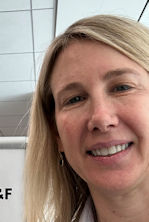 |
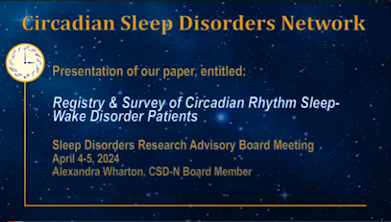 |
Apr 4, 2024
The NIH's Sleep Disorders Research Advisory Board (SDRAB) met on April 4 and 5, 2024 in Bethesda, Maryland. The purpose of the meeting was to update the advisory board and public stakeholders on the progress of sleep and circadian research activities across NIH, and the activities of federal stakeholders and interested organizations.
Alexandra Wharton, CSD-N's representative on SDRAB, traveled to the meeting to present our recently published paper, Registry and Survey of Circadian Rhythm Sleep-Wake Disorder Patients. In her 15-minute talk, she highlighted survey results regarding diagnosis, tiredness, work impact, co-morbidities and treatments. You can view the talk here (talk with slides), or the slides only here (slides only).
She emphasized that Circadian Rhythm Sleep-Wake Disorders (CRSWDs) have a devastating effect on the lives of patients and that these conditions should be considered physiological — not psychological — conditions.
CSD-N's patient survey found that 24% of patients took 10 or more years to receive accurate diagnosis and that 77% were misdiagnosed initially — many with multiple incorrect diagnoses over the years.
Many of our survey respondents reported that their sleep disorder preceded their depression, suggesting that the sleep disorder may have caused the depression rather than the depression causing sleep problems as commonly diagnosed.
The presentation was well received. Findings about the prevalence of sighted non-24, the ineffectiveness of light therapy and the dangers of phase-delay chronotherapy were of special interest to attendees.
Alexandra urged for earlier diagnosis for CRSWDs, asking about best practices for screening patients. For example, she asked the group of clinicians and researchers if it could be possible to routinely administer the Munich Chronotype Questionnaire along with the Epworth Sleepiness Scale at a patient's initial appointment.
She also touched on the potential of DNA testing to help diagnose CRSWDs, although it is not yet widely available.
Several other talks at the meeting were focused on the importance of sleep for maternal health and pregnancy:
Dr. Erik Herzog, biology professor and lab director at Washington University in St. Louis, gave a talk entitled Time to Deliver: Maternal-Fetal Circadian Communication. He explained that there is little known about how the fetus entrains to the mother and how this might impact gestation length. Studying daily rhythms of maternal and placental signals and their roles in birth timing has the potential to translate into clinical care for healthy pregnancies.
Dr. Christina Park, officer for the NIH's Environmental influences on Child Health Outcomes (ECHO) program, described that ECHO's goal is to investigate how environmental exposures early in life — including biological, social, behavioral, natural, and built environments — affect child health and development. ECHO focuses on five key pediatric outcomes that are intertwined with sleep: pre- and post-natal outcomes, upper and lower airway, obesity, neurodevelopment and positive health.
Dr. Gina Wei, senior scientific advisor on women's health with the NHLBI, presented, Women's Health and Maternal Health Research: Opportunities for Sleep Science. She examined risk factors that may affect a woman's likelihood for coronary heart disease. These factors include hormonal changes, high blood pressure, diabetes and lack of physical activity and sleep.
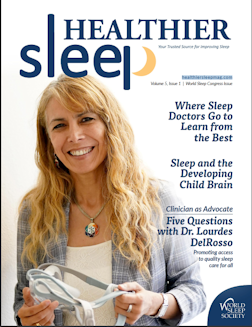
Feb 2024
Circadian Sleep Disorders Network is featured as the "Patient Organization Highlight" on page 17 of the latest issue (Vol 5 Issue 1) of Healthier Sleep Magazine, published by the World Sleep Society.
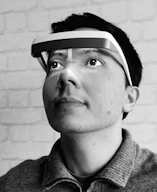
Jan 2024
Member Stephen Larroque was interviewed for an article on his experience with Non-24 in Zeit Wissen magazine. An audio podcast, Der Mann ohne Zeit (the man without time), with him and two research doctors, is available here in the green box near the top of the page. Stephen's comments are in English, but the interviewers and doctors are speaking in German. Note that the text on the web page above is not taken from the interview
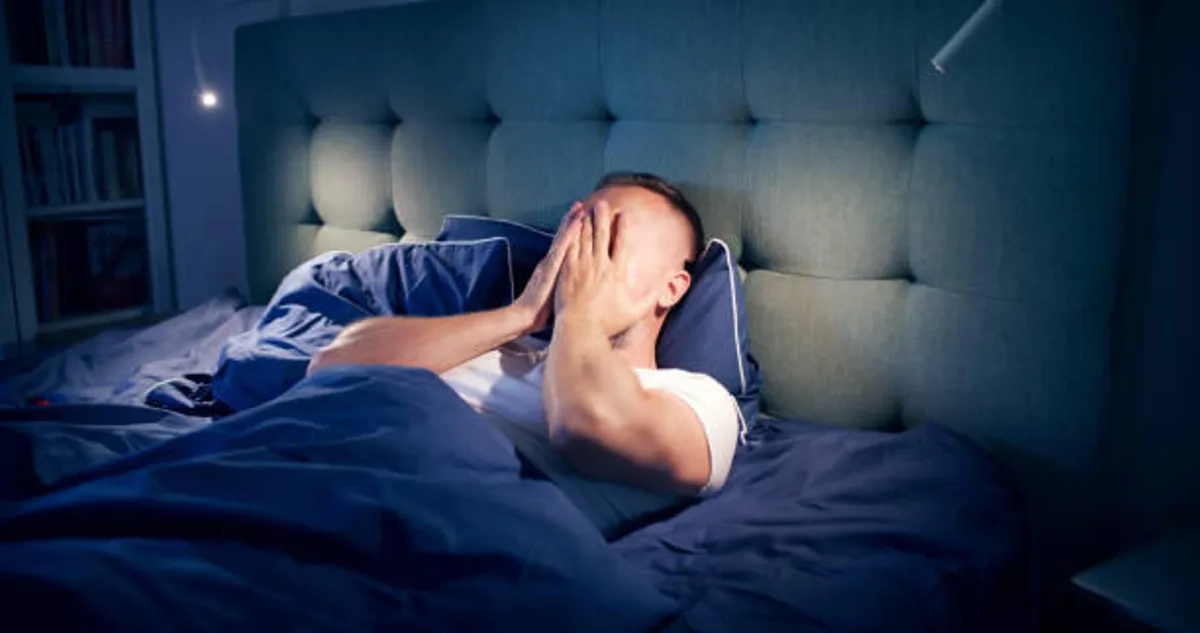
Jan 2024
Our president, Peter Mansbach, and board member Alexandra Wharton were interviewed for this article about Delayed Sleep Phase Syndrome (DSPS):
Delayed Sleep Phase Syndrome: Why Your Internal Clock Keeps You Up at Night, by Arielle Burton (CNET Jan 24, 2024). We don't agree with everything in the article, but it is sympathetic and helps raise awareness.
Dec 2023
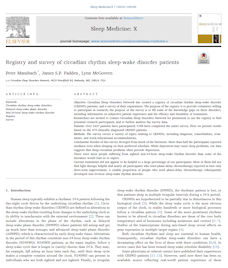
The online version of our manuscript (see next article) is now publicly available (and open source) at doi.org/10.1016/j.sleepx.2023.100100. It is titled Registry and Survey of Circadian Rhythm Sleep-Wake Disorder Patients. Authors are Peter Mansbach, James Fadden, and Lynn McGovern. Published in Sleep Medicine:X, Vol 7.
A PDF of what the printed version will look like is available by clicking View PDF at the top of the online version. A blurred image is at left. It appears that the printed journal will not be printed for some time.
Highlights (quoted from the article):
Dec 2023
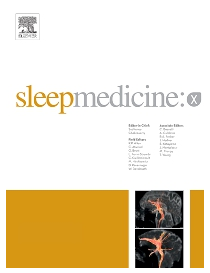 Our manuscript has been accepted for publication by Sleep Medicine:X (the "X" means the article is open access and will be available without charge). It is titled Registry and Survey of Circadian Rhythm Sleep-Wake Disorder Patients. Authors are Peter Mansbach, James Fadden, and Lynn McGovern. Publication date has not been announced.
Our manuscript has been accepted for publication by Sleep Medicine:X (the "X" means the article is open access and will be available without charge). It is titled Registry and Survey of Circadian Rhythm Sleep-Wake Disorder Patients. Authors are Peter Mansbach, James Fadden, and Lynn McGovern. Publication date has not been announced.
The article discusses the purpose of the registry and survey and how it was structured. It presents some statistical results from the survey, and the conclusions we draw from that. It calls into question several assumptions made by doctors in the past.
It took altogether 7 years, from when we first created the survey questionnaire to final acceptance. This included waiting for a large enough number of respondents, then analyzing the responses, writing and editing the manuscript, and responding to reviewers.
Thanks to the many circadian rhythm sleep disorders sufferers who participated in the survey - more than 1600 as of when we analyzed the data for this paper. Note that the survey is still open (www.CircadianSleepDisorders.org/survey), and new participants will be included in our next analysis.
This is a free mailing list support group for people with DSPS and Non-24 to share their experiences. It's a good place for people just discovering these disorders to hear how others deal with them, as well as for long-time participants to get support and to provide support to others. There are often discussions of evolving treatment, useful to all. For further information, and to sign up, go to www.circadiandisorders.org/list.
Note that membership in Circadian Sleep Disorders Network and membership on this email list are completely separate.
Circadian Sleep Disorders Network is affiliated with this email list, and our volunteers assist the list administrator with some chores. CSD-N was formed by participants on this list, and many of our members post regularly. But we have no control over what appears or who can join, and list membership is completely separate from membership in CSD-N.
Once you've signed up for the list, you post by sending an email to Everyone on the mailing list receives that post as an email, and you receive everyone else's posts as emails. If you don't like to get separate emails, you can opt to receive in digest form, typically one email a day containing all the day's posts. You make that selection after signing up by logging in (using the password you created when signing up for the email list) at www.circadiandisorders.org/list.
There are some rules:
The rules that the list software enforces are
An additional rule is PLEASE do not just reply to a message with a subject line containing "Niteowl Digest, Vol xxx, Issue xxx". That is obviously not informative and if you aren't careful you may include the whole list of messages in the Digest, making your message too large for the list.
Digest or not, it is a good idea to trim whatever you are replying to leaving just enough for people to know what you are replying to.
Of course, don't be snippy or insulting, and please take off-topic conversations off-list. And no advertising.
Once you've signed up for the list, you can also browse previous posts in the archive at
lists.circadiandisorders.org/private.cgi/niteowl-circadiandisorders.org/.
There is also a mirror of the archive on Yahoo at https://groups.yahoo.com/neo/groups/nite-owl/info. This is useful when the primary archives are not working, as sometimes happens. Login to your Yahoo account, or create one (free) - link is at the top right on that page. Then you have to join the Yahoo copy of the list - this is separate from signing up for the list itself - there is a button on the Yahoo page to do this.
To unsubscribe from the Niteowl email list go to
http://lists.circadiandisorders.org/listinfo.cgi/niteowl-circadiandisorders.org
and follow the directions at the bottom of the page. You will need to know your list password.
If you do not know your list password, send email to
niteowl-request@lists.circadiandisorders.org
with PASSWORD in the subject line. This email must come from the same email address that you subscribed from (which is the one your incoming Niteowl list emails go to). Your password will be sent to you at that address.
If that doesn't work, you can unsubscribe by sending email to
niteowl-request@lists.circadiandisorders.org
with UNSUBSCRIBE in the subject line. This email must come from the same email address that you subscribed from (which is the one you your incoming Niteowl list emails go to). If you do this, you will get an email back asking you to confirm. You must follow the instructions and confirm, or you will not be unsubscribed.
For more (or more current) help on list commands, send email to
niteowl-request@lists.circadiandisorders.org
with HELP in the subject line.
 Our brochure is geared to the general public, to introduce DSPD (DSPS) and Non-24 to people experiencing symptoms of these disorders, and to their families.
Please distribute it to anyone who may be interested.
Print on lightly colored paper for some color, if you like. We used ivory.
Our brochure is geared to the general public, to introduce DSPD (DSPS) and Non-24 to people experiencing symptoms of these disorders, and to their families.
Please distribute it to anyone who may be interested.
Print on lightly colored paper for some color, if you like. We used ivory.
| Brochure - web display |
Print on US letter size paper, PDF Print on A4 size paper, PDF |
The web display version shows the brochure panels in easy-to-read order. The print versions are meant to be printed out on both sides of a sheet of paper, then folded in thirds, creating a brochure. (In the print version, the panels will appear out of order on-screen.)
We have posted documents describing DSPD (DSPS) and Non-24, in an easy to read Question-and-Answer format. These are designed to give to family members, friends, employers, and school personnel, to help them understand these disorders. Feel free to print and distribute these. There are two different (but similar) versions, one for DSPD and the other for Non-24:
| DSPD Q&A - web | printer | booklet* |
| Non-24 Q&A - web | printer | booklet* |
The web formats display nicely in your browser.
The printer versions are formatted by your browser for printing a multi-page document.
The booklet forms are pre-formatted PDF files that you can print on two sides of a single sheet of paper, which then folds in half into a booklet.
* When printing the booklet, be sure to flip on the short edge (select this option if you have a double-sided printer).
| Spanish: | DSPS Preguntas y Respuestas - web | printer |
| No-24 Preguntas y Respuestas - web | printer | |
| German: | DSPS F&A - web | printer |
| Non-24 F&A - web | printer |
We also have a one page Basic Fact Sheet that introduces DSPD and Non-24 to people who don't know about them. It's a quick and easy read, just the basics.
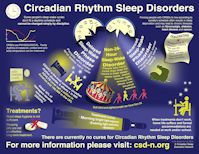 Former board member and artist Lily Style has created an infographic describing Circadian Rhythm Sleep Disorders. View it in your browser at www.circadiansleepdisorders.org/docs/CRSDGraphic.php. Feel free to repost the graphic to help raise awareness.
Former board member and artist Lily Style has created an infographic describing Circadian Rhythm Sleep Disorders. View it in your browser at www.circadiansleepdisorders.org/docs/CRSDGraphic.php. Feel free to repost the graphic to help raise awareness.
You can print it directly from your browser (we suggest making the browser window full screen - the image will resize). We are also posting JPG images in various proportions for printing directly on different sizes of paper:
You can download these (in Microsoft Windows, right-click and select Save As). To print in Microsoft Windows, right-click on the downloaded file (in File Explorer) and select Print. Or open it in a photo- or image-processing program to use that program's features such as borderless printing.
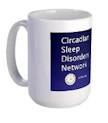 We had offered merchandise (mugs, T-shirts, tote bags, bumper stickers, and a messenger bag) with our name and logo through CafePress,
but our account was closed for lack of activity. We might offer these again at some point, but if no one wants this stuff, there's no point in recreating all the designs.
We had offered merchandise (mugs, T-shirts, tote bags, bumper stickers, and a messenger bag) with our name and logo through CafePress,
but our account was closed for lack of activity. We might offer these again at some point, but if no one wants this stuff, there's no point in recreating all the designs.

Circadian Sleep Disorders Network is a Coalition Partner of Start School Later.
We understand only too well the difficulties many teens have with early school start time, and we support the move to start school later.
This is a list of refences added to our Info page since the last newsletter. The newsletter lists references added since the previous newsletter. These lists are generally available to members only.
This web site is intended to provide generic information about Circadian Rhythm Sleep Disorders, and
is not intended to replace discussions with a healthcare provider.
You should not use the information on this website for diagnosing or treating a medical or health condition.
All decisions regarding patient care should be made with your healthcare provider.
Contact:
Email:
Office: 4619 Woodfield Rd, Bethesda, MD 20814
Phone: By appointment only, please.
browser: Mozilla/5.0 AppleWebKit/537.36 (KHTML, like Gecko; compatible; ClaudeBot/1.0; +claudebot@anthropic.com)
PHP version 8.2.29